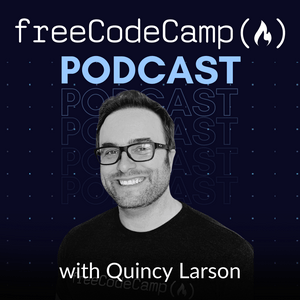Today Quincy Larson interviews Shawn Wang. He's a software engineer, founder of the AI Engineer conference, and host of the Latent Space podcast focused on applying the latest models toward getting work done.
We talk about:
- How even if LLMs plateau, there will be still paths to better output through surrounding harness code
- And three big areas researchers are exploring to further improve model performance: World Models, Multi-modality, and Embodied AI
- Which skills Shawn thinks are most important for developers going forward
- And why Shawn thinks you should switch your own self teaching from "just-in-time learning" to "just-in-case learning"
Support for this podcast comes from the 10,113 kind folks who donate to our charity each month. Join them and support our mission at https://donate.freecodecamp.org
Get a freeCodeCamp tshirt for $20 with free shipping anywhere in the US: https://shop.freecodecamp.org
Links from our discussion:
- Shawn's Tiny Teams Playbook: https://www.latent.space/p/tiny
- Shawn's interview with FeiFei Li: https://www.latent.space/p/after-llms-spatial-intelligence-and?utm_source=publication-search
- Boots Theory: https://en.wikipedia.org/wiki/Boots_theory
- Wirth's Law: https://en.wikipedia.org/wiki/Wirth%27s_law
- Adversarial Reasoning: https://www.latent.space/p/adversarial-reasoning
Community news section:
1. freeCodeCamp just published a comprehensive course that will teach you how to use the security-focused Kali Linux operating system. You'll learn how to identify, exploit, and defend against real-world vulnerabilities. You'll also build a solid foundation in penetration testing, network security, and vulnerability assessment. Most importantly, you'll learn how to think like a security engineer and leverage tools of the trade like Nmap and Wireshark. (4 hour YouTube course): https://www.freecodecamp.org/news/learn-cybersecurity-and-ethical-hacking-using-kali-linux/
2. freeCodeCamp also published a guide to passing the Certified Kubernetes Administrator Exam. Beau Carnes teaches this course, which will walk you through key DevOps concepts. You'll start by setting up your K8s practice environment. Then you'll bootstrap a multi-node cluster and your control plane. You'll learn about Helm, High Availability Autoscaling, CoreDNS, and more. (2 hour YouTube course): https://www.freecodecamp.org/news/prepare-for-the-kubernetes-administrator-certification-and-pass/
3. We also just published a full-length handbook on freeCodeCamp Press that you can read right in your browser. It will teach you modern React data fetching best practices. You'll learn how to leverage Suspense, ErrorBoundary, and the new Use API. If you're interested in web development, this is well worth bookmarking. (full length handbook): https://www.freecodecamp.org/news/the-modern-react-data-fetching-handbook-suspense-use-and-errorboundary-explained/
5. Finally, I'm proud to share this new DevOps course that freeCodeCamp instructor Gavin Lon just published. You'll learn how to take a full stack app on your local machine and ship it to a fully containerized production environment. Along the way, you'll learn about CI/CD pipelines, Docker images, launching containers, and more. By the end of the course, you'll have a professional-grade pipeline that automatically builds and deploys updates with every push. (4 hour YouTube course): https://www.freecodecamp.org/news/build-a-production-ready-pipeline-with-docker-cicd-and-hostinger/
5. Today's song of the week is the 1980 classic "Turn me Loose" by Canadian band Loverboy. Build on top of a super catchy syncopated bassline, this song has some super expressive vocals, buzzing synths, percussive piano, and the guitar solo is top shelf. https://www.youtube.com/watch?v=TnHm4ro_l8s


